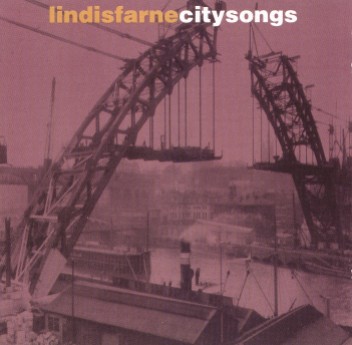| City Songs (1998) |
|
|
 |
| City Songs (1998) |
|
|
 |
1. Lady Eleanor Alan Hull 4:02 2. City Song Alan Hull 4:27 3. Train in G major Rod Clements 3:11 4. Fog on the Tyne Alan Hull 3:31 5. Scotch Mist Lindisfarne 2:07 6. Mandolin King Alan Hull 2:41 7. Poor old Ireland Alan Hull 3:18 8. Road to Kingdom come Rod Clements 4:11 9. Lady Eleanor Alan Hull 4:08 10. Drug Song Alan Hull 3:05 11. Country Gentleman's wife Alan Hull 3:50 12. Passing Ghosts Alan Hull 2:30 13. Turn a deaf ear Rab Noakes 3:44 14. Lady Eleanor Alan Hull 3:46 15. Scarecrow Song Alan Hull 3:00 16. Meet me on the corner Rod Clements 2:24 Tracks 1-5: Bob Harris: 08.06.71 - Tracks: 6-9: John Peel: 08.05.72
Tracks 10-13: Bob Harris: 14.06.72 - Tracks 14-16: Poetry Plus (Royal Festival Hall) 31.05.72
Album Cover Info
When Lindisfarne first made their U.K. breakthrough in the early seventies, they were described as a 'breath of fresh air' by observers of a music scene dominated by hard rock and glam. Lindisfarne's sound was an irresistible combination of folk, blues and classic pop that was performed with an up-front northern swagger.
As they rapidly progressed to major band status, they recorded radio sessions for the BBC on a regular basis and featured on programmes as diverse as "The Mike Raven Blues Show", "Country Meets Folk", "The John Peel Show" and "The Bob Harris Show".
The material featured in the first three sessions on this album was performed by the original Lindisfarne line up of Alan Hull on vocals, guitar and keyboards, Rod Clements on bass, slide guitar, violin and occasional vocal, Ray Jackson on vocals, harmonicas and mandolin, Simon Cowe on vocals, guitar, keyboards and mandolin and Ray Laidlaw on drums.
The sessions usually took place at the BBC's Maida Vale studios. Lindisfarne would generally make for the canteen for a late breakfast and then on to the studio to discuss the session's content with the producer. The sessions were casual, sociable affairs with a great deal of mutual piss-taking between the band, engineers and producer. The band were particularly fond of John Walters who was John Peel's producer.
Walters, who had been a brass player in the Alan Price Set was familiar with Tyneside humour and became the target of many Lindisfarne wind-ups but was no slouch in returning the compliment. Frequently Lindisfarne got bored with the repetition of the hits and pushed more obsure songs. On some occasions they got away with it and on others they retained their enthusiasm by amending arrangements, instrumentation and lead vocalists.
Lindisfarne were usually accompanied by their music publisher Barbara Hayes and Charisma Record's publicist Glen Colson whose main function was to haul along music journalists for an insiders view of Lindisfarne at work and to supply the liquid refreshments from the local off-licence. Frequently these quests had to be silently smuggled in past the next studio where the BBC Symphony Orchestra was rehearsing. Due to the nature of the sessions, this task was a lot more difficult on the way out.
It was particularly due to these intimate evenings that Lindisfarne became the darlings of the music press and rocketed to fame during the early seventies.
Thanks to: Steve Weltman and Ray Laidlaw, Chris Hart for the cuttings, Chris & Deanna for the images, Steve for the imaging. Mastered at Black Noise by Jolly